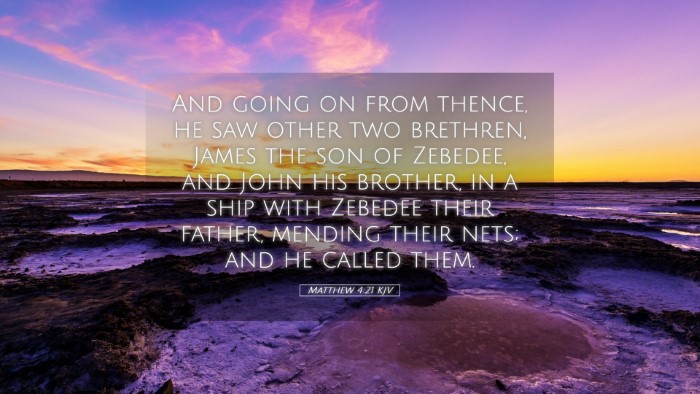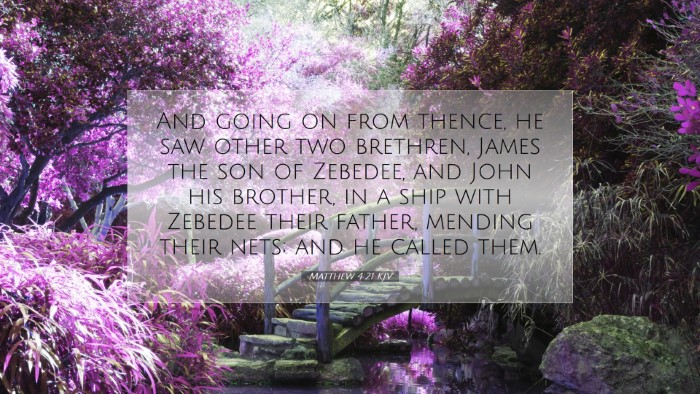Bible Commentary on Matthew 4:21
Introduction
Matthew 4:21 states: "Going on from there, He saw two other brothers, James the son of Zebedee, and John his brother, in the boat with Zebedee their father, mending their nets. He called them."
This verse captures a pivotal moment in the early ministry of Jesus, highlighting His selection of the disciples who would accompany Him in the proclamation of the Kingdom of God. Various commentators have explored the significance, context, and implications of this moment.
Understanding the Context
In the preceding verses, Jesus has begun His public ministry, calling for repentance and announcing the arrival of the Kingdom. The calling of the first disciples indicates a strategic move to form a core group that would learn from Him and participate in His mission.
-
Matthew Henry: Henry emphasizes that Jesus deliberately chose to call ordinary fishermen, showcasing that His ministry is accessible to all, regardless of social status. The choice of disciples from familiar trades underscores the foundational idea of God calling people from their everyday lives to extraordinary purposes.
-
Albert Barnes: Barnes elaborates on the setting, noting that the disciples were engaged in a mundane task—mending their nets—indicative of their life before following Christ. This illustrates how Jesus transforms ordinary moments into divine calling.
-
Adam Clarke: Clarke notes the geographical setting of this calling. Being on the Sea of Galilee, he posits that Jesus’ choice of location was intentional, as it would be a central hub for His ministry. The presence of Zebedee adds a familial element, illustrating the ties that would be disrupted by the call to follow.
The Implications of “Calling”
The act of calling is profoundly significant in this passage. It serves as an invitation into discipleship, and each commentator sheds light on different facets of what it means to be called by Christ.
-
Matthew Henry: He suggests that Christ’s call is not merely for a moment but a lifetime commitment. The disciples' immediate response highlights their willingness to forsake their previous life for the sake of Christ's calling.
-
Albert Barnes: Barnes interprets the immediacy of their response as not only a testament to their faith but also indicative of the persuasive power of Christ’s words. He connects this to the overarching theme of vocational transformation in the Kingdom of God.
-
Adam Clarke: Clarke adds that the very nature of the call involves a personal relationship, indicating that Jesus knows His disciples personally and intimately, drawing them into a shared mission.
The Symbolism of Nets
Mending nets carries a wealth of symbolism. This task reflects not only the disciples' prior livelihood but also the concept of preparation and readiness for the tasks ahead.
-
Matthew Henry: He acknowledges that the nets represent both the means of their previous failings and their readiness to ‘catch’ men for the Kingdom. The mending signifies that they were not only skilled but also responsible individuals who would soon be entrusted with spiritual tasks.
-
Albert Barnes: Barnes points out that the act of mending themselves serves as an important metaphor for preparation before ministry. It reflects the necessity for inner healing and readiness to engage in God’s work.
-
Adam Clarke: Clarke furthers this idea, suggesting that the nets symbolize the souls that they would later reach, requiring care, precision, and diligence, similar to their trade as fishermen.
The Role of Family and Community
The presence of Zebedee, the father of James and John, raises questions about familial bonds and the radical nature of discipleship that Jesus demands.
-
Matthew Henry: Henry notes that the call to leave family ties should not be taken lightly. The immediate abandonment of their father signifies the profound urgency with which discipleship is to be pursued, illustrating the priorities in the Kingdom of God.
-
Albert Barnes: He reflects on the nature of sacrifice involved in following Christ—how family relationships might be affected by one's commitment to the Gospel. This decision highlights the ultimate allegiance required in discipleship.
-
Adam Clarke: Clarke suggests that leaving one’s family for the sake of the Gospel reflects the transformative power of Jesus' call, which takes precedence over earthly relationships. He poses that this serves as a reminder of the eternal priorities of the Kingdom.
Conclusion
Matthew 4:21 serves as a profound insight into the nature of discipleship and the implications of following Christ. Through the perspectives of Matthew Henry, Albert Barnes, and Adam Clarke, we can glean rich truths about the call to follow Jesus, the symbolism within the verse, and the sacrifices that may be required in the journey of faith.
The immediate response of James and John in this passage challenges modern readers to consider their own responses to Christ’s call. As pastors and theologians reflect on these insights, it becomes essential to grapple with how these principles apply in our contemporary context of ministry and personal faith.


